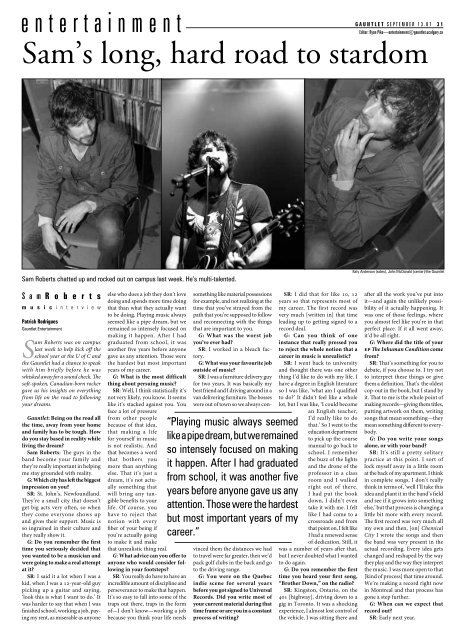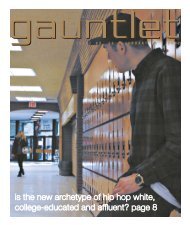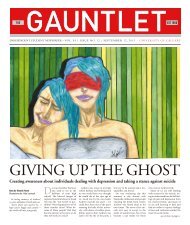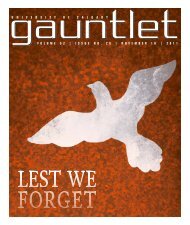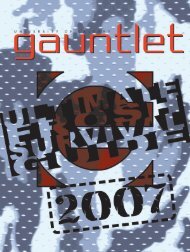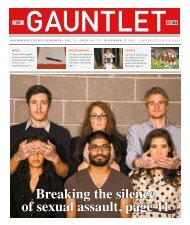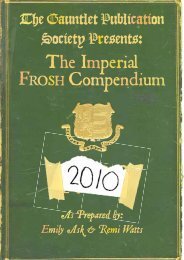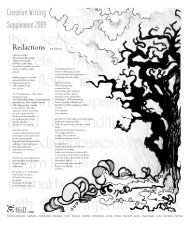PDF Edition - The Gauntlet
PDF Edition - The Gauntlet
PDF Edition - The Gauntlet
Create successful ePaper yourself
Turn your PDF publications into a flip-book with our unique Google optimized e-Paper software.
entertainment<br />
GAUNTLET SEPTEMBER 13.07 31<br />
Editor: Ryan Pike—entertainment@gauntlet.ucalgary.ca<br />
Sam’s long, hard road to stardom<br />
Sam Roberts chatted up and rocked out on campus last week. He’s multi-talented.<br />
S a m R o b e r t s<br />
m u s i c i n t e r v i e w<br />
Patrick Rodrigues<br />
<strong>Gauntlet</strong> Entertainment<br />
Sam Roberts was on campus<br />
last week to help kick off the<br />
school year at the U of C and<br />
the <strong>Gauntlet</strong> had a chance to speak<br />
with him briefly before he was<br />
whisked away for a sound check. Th e<br />
soft -spoken, Canadian-born rocker<br />
gave us his insights on everything<br />
from life on the road to following<br />
your dreams.<br />
<strong>Gauntlet</strong>: Being on the road all<br />
the time, away from your home<br />
and family has to be tough. How<br />
do you stay based in reality while<br />
living the dream?<br />
Sam Roberts: Th e guys in the<br />
band become your family and<br />
they’re really important in helping<br />
me stay grounded with reality.<br />
G: Which city has left the biggest<br />
impression on you?<br />
SR: St. John’s, Newfoundland.<br />
Th ey’re a small city that doesn’t<br />
get big acts very often, so when<br />
they come everyone shows up<br />
and gives their support. Music is<br />
so ingrained in their culture and<br />
they really show it.<br />
G: Do you remember the fi rst<br />
time you seriously decided that<br />
you wanted to be a musician and<br />
were going to make a real attempt<br />
at it?<br />
SR: I said it a lot when I was a<br />
kid, when I was a 12-year-old guy<br />
picking up a guitar and saying,<br />
‘look this is what I want to do.’ It<br />
was harder to say that when I was<br />
fi nished school, working a job, paying<br />
my rent, as miserable as anyone<br />
else who does a job they don’t love<br />
doing and spends more time doing<br />
that than what they actually want<br />
to be doing. Playing music always<br />
seemed like a pipe dream, but we<br />
remained so intensely focused on<br />
making it happen. After I had<br />
graduated from school, it was<br />
another fi ve years before anyone<br />
gave us any attention. Th ose were<br />
the hardest but most important<br />
years of my career.<br />
G: What is the most difficult<br />
thing about persuing music?<br />
SR: Well, I think statistically it’s<br />
not very likely, you know. It seems<br />
like it’s stacked against you. You<br />
face a lot of pressure<br />
from other people<br />
because of that idea,<br />
that making a life<br />
for yourself in music<br />
is not realistic. And<br />
that becomes a word<br />
that bothers you<br />
more than anything<br />
else. That it’s just a<br />
dream, it’s not actually<br />
something that<br />
will bring any tangible<br />
benefi ts to your<br />
life. Of course, you<br />
have to reject that<br />
notion with every<br />
fi ber of your being if<br />
you’re actually going<br />
to make it and make<br />
that unrealistic thing real.<br />
G: What advice can you off er to<br />
anyone who would consider following<br />
in your footsteps?<br />
SR: You really do have to have an<br />
incredible amount of discipline and<br />
perseverance to make that happen.<br />
It’s so easy to fall into some of the<br />
traps out there, traps in the form<br />
of—I don’t know—working a job<br />
because you think your life needs<br />
something like material possessions<br />
for example, and not realizing at the<br />
time that you’ve strayed from the<br />
path that you’re supposed to follow<br />
and reconnecting with the things<br />
that are important to you.<br />
G: What was the worst job<br />
you’ve ever had?<br />
SR: I worked in a bleach factory.<br />
G: What was your favourite job<br />
outside of music?<br />
SR: I was a furniture delivery guy<br />
for two years. It was basically my<br />
best friend and I driving around in a<br />
van delivering furniture. Th e bosses<br />
were out of town so we always con-<br />
“Playing music always seemed<br />
like a pipe dream, but we remained<br />
so intensely focused on making<br />
it happen. After I had graduated<br />
from school, it was another fi ve<br />
years before anyone gave us any<br />
attention. Those were the hardest<br />
but most important years of my<br />
career.”<br />
vinced them the distances we had<br />
to travel were far greater, then we’d<br />
pack golf clubs in the back and go<br />
to the driving range.<br />
G: You were on the Quebec<br />
indie scene for several years<br />
before you got signed to Universal<br />
Records. Did you write most of<br />
your current material during that<br />
time frame or are you in a constant<br />
process of writing?<br />
SR: I did that for like 10, 12<br />
years so that represents most of<br />
my career. <strong>The</strong> first record was<br />
very much [written in] that time<br />
leading up to getting signed to a<br />
record deal.<br />
G: Can you think of one<br />
instance that really pressed you<br />
to reject the whole notion that a<br />
career in music is unrealistic?<br />
SR: I went back to university<br />
and thought there was one other<br />
thing I’d like to do with my life. I<br />
have a degree in English literature<br />
so I was like, ‘what am I qualifi ed<br />
to do?’ It didn’t feel like a whole<br />
lot, but I was like, ‘I could become<br />
an English teacher,<br />
I’d really like to do<br />
that.’ So I went to the<br />
education department<br />
to pick up the course<br />
manual to go back to<br />
school. I remember<br />
the buzz of the lights<br />
and the drone of the<br />
professor in a class<br />
room and I walked<br />
right out of there.<br />
I had put the book<br />
down, I didn’t even<br />
take it with me. I felt<br />
like I had come to a<br />
crossroads and from<br />
that point on, I felt like<br />
I had a renewed sense<br />
of dedication. Still, it<br />
was a number of years aft er that,<br />
but I never doubted what I wanted<br />
to do again.<br />
G: Do you remember the fi rst<br />
time you heard your fi rst song,<br />
“Brother Down,” on the radio?<br />
SR: Kingston, Ontario, on the<br />
401 [highway], driving down to a<br />
gig in Toronto. It was a shocking<br />
experience, I almost lost control of<br />
the vehicle. I was sitting there and<br />
Katy Anderson (sides), John McDonald (center)/the <strong>Gauntlet</strong><br />
aft er all the work you’ve put into<br />
it—and again the unlikely possibility<br />
of it actually happening. It<br />
was one of those feelings, where<br />
you almost feel like you’re in that<br />
perfect place. If it all went away,<br />
it’d be all right.<br />
G: Where did the title of your<br />
EP Th e Inhuman Condition come<br />
from?<br />
SR: Th at’s something for you to<br />
debate, if you choose to. I try not<br />
to interpret these things or give<br />
them a defi nition. Th at’s the oldest<br />
cop-out in the book, but I stand by<br />
it. Th at to me is the whole point of<br />
making records—giving them titles,<br />
putting artwork on them, writing<br />
songs that mean something—they<br />
mean something diff erent to everybody.<br />
G: Do you write your songs<br />
alone, or with your band?<br />
SR: It’s still a pretty solitary<br />
practice at this point. I sort of<br />
lock myself away in a little room<br />
at the back of my apartment. I think<br />
in complete songs, I don’t really<br />
think in terms of, ‘well I’ll take this<br />
idea and plant it in the band’s fi eld<br />
and see if it grows into something<br />
else,’ but that process is changing a<br />
little bit more with every record.<br />
Th e fi rst record was very much all<br />
my own and then, [on] Chemical<br />
City I wrote the songs and then<br />
the band was very present in the<br />
actual recording. Every idea gets<br />
changed and reshaped by the way<br />
they play and the way they interpret<br />
the music. I was more open to that<br />
[kind of process] that time around.<br />
We’re making a record right now<br />
in Montreal and that process has<br />
gone a step further.<br />
G: When can we expect that<br />
record out?<br />
SR: Early next year.


